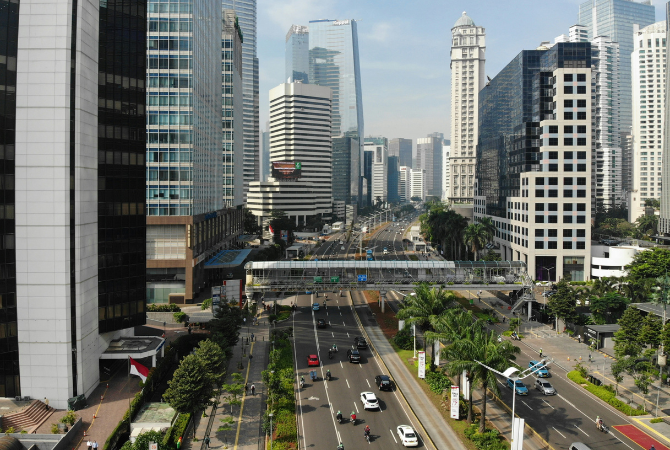A decade later: ‘Cost‑of‑living’ overtakes ‘corruption’ as Indonesians’ most important issue in 2025

Roy Morgan’s latest research reveals a reshuffling of Indonesians’ priorities over the past decade, amid economic expansion, bold reforms, and escalating household challenges.
A representative cross-section of Indonesians aged 17+, were interviewed by Roy Morgan between October 2014 – March 2015 (15,204 interviews) and October 2024 – March 2025 (5,499 interviews) and were asked: “Which three issues are the most important to you” (Mark the three most important issues).
‘Keeping day‑to‑day living costs down’ now leads the national agenda in 2025, with 44% of Indonesians citing it as one of their top three most important issues, up 10% points from 34% in 2014–15.
‘Fighting corruption’ remains a top priority, holding steady at 41% of Indonesians, the same as a decade ago.
Labor market concerns and persistent poverty challenges in Indonesia
Labor‑market issues have also risen in importance. Concern about ‘Reducing unemployment’ increased to nearly a third of the population, from 24% to 31% (up 7% points), and the share of Indonesians mentioning ‘Fair workplace and employment regulations’ as an important issue rose from 7% to 10% (up 3% points).
Concern about ‘managing the economy’ increased 6% points to nearly one in three Indonesians (from 25% to 31%). However, Indonesian attitudes toward ‘poverty eradication’ have remained remarkably stable, with concern about this issue rising marginally from 29% to 30% (up 1% point) of Indonesians.
Top 10 Most Important Issues in Indonesia (2015 vs. 2025)

Source: Roy Morgan Single Source Indonesia. Base: Indonesians aged 17+ October 2014 – March 2015 (n 15,204) and October 2024 – March 2025 (n 5,499).
Declining concern for public services highlights growing economic challenges
Public‑service concerns have eased with those Indonesians mentioning ‘Improving health services and hospitals’ as an important issue declining from 19% to 14% (down 5% points) compared to a decade ago.
In addition, a falling share of Indonesians mentioned ‘Improving education’ as an important issue, down 8% points from 32% to 24%. Fewer than one-in-ten Indonesians now mention ‘Building adequate infrastructure such as roads’ as an important issue, down 4% points from 12% to 8%.
Those Indonesians naming ‘open and honest government’ as an important issue slipped 5% points from a decade ago, from 19% to 14%, suggesting either increased confidence in institutional transparency or a refocusing on economic challenges.
Concern about ‘Defence and national security’ has remained steady at 7% over the past decade, showing no shift. This stability indicates these issues remain a consistent but lower priority for Indonesians.
The issues of ‘Managing the environment’ and ‘warning and handling of natural disasters’ have both held steady at 2% over the past decade and haven’t gained greater urgency in the public’s priorities.
Meanwhile, concern about ‘the needs of families’ has risen modestly from 14% to 16% of Indonesians, and ‘fighting for the rights of minority groups’ has edged up from 5% to 6%.
Roy Morgan CEO Michele Levine says Indonesians are prioritising ‘cost of living’ as a concern in the early days of President Prabowo Subianto’s first term:

“Nearly half of Indonesians (44%) rate ‘Keeping day to day living costs down’ as the top issue during the first six months of President Prabowo’s first term – up 10% points from a decade ago. The issue has now overtaken corruption at 41% (unchanged) as Indonesians’ top concern.
“Other concerns to rate significantly higher in 2025 compared to a decade ago include ‘Reducing unemployment’ at 31% (up 7% points since 2015), ‘Managing the economy’ at 31% (up 6% points) and ‘Fair workplace and employment regulations’ at 10% (up 3% points).
“In contrast, two issues to lose importance compared to a decade ago are ‘Improving education’ mentioned by 24% (down 8% points) of Indonesians and ‘Improving health services and hospitals’ on 14% (down 5% points). Poverty eradication remains stubbornly unchanged at 30%, highlighting persistent social welfare challenges that continue to demand attention.”
This Roy Morgan survey throughout Indonesia was conducted from October 2014 – March 2015 (n 15,204) and October 2024 – March 2025 (n 5,499) with a representative cross-section of Indonesians aged 17+.
For comments or more information about Roy Morgan’s data please contact:
Ira Soekirman: Office +62 21 572 2021 Mobile +62 811165400
Roy Morgan Enquiries
Office: +61 (3) 9224 5309
askroymorgan@roymorgan.com
Reports available for sale:
The latest Roy Morgan data is available on the Roy Morgan Online Store. It provides demographic breakdowns for Age, Sex, State, Region (Capital Cities/ Country), Generations, Lifecycle, Socio-Economic Scale, Work Status, Occupation, Home Ownership, Voting Intention, Roy Morgan Value Segments, Helix Personas, Media Consumption, and more.
Related Research:
About Roy Morgan
Roy Morgan is Australia’s largest independent Australian research company, with offices in each state, as well as in the Indonesia, U.S. and U.K. A full-service research organisation, Roy Morgan has over 80 years’ experience collecting objective, independent information on consumers.
Margin of Error
The margin of error to be allowed for in any estimate depends mainly on the number of interviews on which it is based. Margin of error gives indications of the likely range within which estimates would be 95% likely to fall, expressed as the number of percentage points above or below the actual estimate. Allowance for design effects (such as stratification and weighting) should be made as appropriate.
| Sample Size | Percentage Estimate |
| 40% – 60% | 25% or 75% | 10% or 90% | 5% or 95% | |
| 1,000 | ±3.0 | ±2.7 | ±1.9 | ±1.3 |
| 5,000 | ±1.4 | ±1.2 | ±0.8 | ±0.6 |
| 7,500 | ±1.1 | ±1.0 | ±0.7 | ±0.5 |
| 10,000 | ±1.0 | ±0.9 | ±0.6 | ±0.4 |
| 20,000 | ±0.7 | ±0.6 | ±0.4 | ±0.3 |
| 50,000 | ±0.4 | ±0.4 | ±0.3 | ±0.2 |



